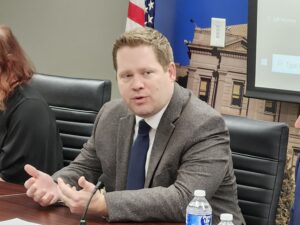After a month of deliberation, a Colorado interim legislative committee voted Tuesday to draft a bill that would allow an underutilized enterprise to offer grants for commercial fleets to replace older vehicles with newer gas-burning trucks rather than just with electric rigs.
The 16-5 decision by the Transportation Legislation Review Committee is notable as an acknowledgment that Colorado’s wide-ranging emissions-reduction strategies should include efforts to promote less-polluting technology as well as zero-emissions technology. Whether the full Legislature will agree with the approach of the joint House and Senate transportation committees won’t be known until the 2026 session, however.
Created as part of the $5.3 billion transportation-funding bill in 2021, the Clean Fleet Enterprise gets money from both the 29-cent retail delivery fee on everything from Amazon to DoorDash orders and from the 32-cent fee on Uber and Lyft rides. It is expected to receive about $22.8 million this year, nearly $15 million of which can be put toward grants to help commercial trucking companies replace older vehicles.
Right now, that money can be spent only on zero-emission electric trucks or on compressed natural-gas vehicles that use fuel that is at least 90% recovered methane. But electric-truck makers have been unable to meet demand — with many having delayed or canceled orders altogether — and the funding has resulted in just 23 new trucks being acquired with it since July 2022, said Sen. Kyle Mullica, D-Thornton.
Reasoning behind the plan
So, Mullica and Senate Minority Leader Cleave Simpson, R-Alamosa, want to try a new tact: Using the money to help owners of diesel trucks made before 2009 to replace them with combustion-engine vehicles made in 2018 or later, via grants, loans or rebates. The dates represent two evolutions of federal fuel-efficiency standards, and supporters have said that removing 10 trucks made before 2009 would cut pollution as much as removing 60 trucks made after 2018.
Some environmental groups and state legislators have questioned the efficacy of such a proposal, and past efforts to do something similar have been quashed by opponents saying that the state should only pay to help private companies get zero-emission trucks. But Mullica persuaded even several skeptical colleagues Tuesday that rather than let potential grant funding sit and wait for truck makers to catch up to the state’s requirements, the state should use the money now to cut emissions in a different but still significant way.
“The saying goes: ‘Don’t let the perfect be the enemy of the good.’ I think we are trying to figure out how this program could be better utilized,” Mullica told the TLRC. “There’s hope that there would have been more than 23 new trucks on the road.”

Colorado state Sen. Kyle Mullica speaks to the Colorado Chamber of Commerce Tax Council in March 2024.
Five Democrats still voted against the proposal, showing that it will face opposition from a Legislature that has made efforts in recent years to take big steps in cutting emissions while the Northern Front Range is in severe violation of federal ozone standards. But eight joined with Republicans in voting to draft a bill that will be considered TLRC legislation — a designation that carries with it a seal that a proposal has been vetted already by a group of legislators and gotten support from a majority of it.
How the grants for new trucks would work
The proposed bill will create guardrails around the new use of money.
No more than 20% of grant money that the fund can offer would go to combustion-engine trucks if the measure passes. Grant recipients must be heavy-duty trucks of at least 26,000 pounds. Recipient companies must be based in Colorado, and 75% of their fleet mileage must be driven in-state. And the program would sunset in five years.
The proposal also would ensure that the old trucks that are being replaced are taken off the road and scrapped rather than sold to other companies. Funding recipients not only would have to surrender the truck at the time of transaction but would have to decommission it by drilling a hole in the engine’s block and cutting the chassis rails in half, according to the language of the draft bill.

An older truck spews smoke.
Organizations like the Colorado Motor Carriers Association and the Colorado Wyoming Petroleum Marketers Association stumped for the idea, saying it represents an evolution in the way the state reduces emissions — doing it without imposing costly burdens. It would offer a way to eliminate emissions quickly by helping smaller, less-capitalized trucking companies, which are the ones most likely to be driving older trucks and least likely to be able to afford electric vehicles when they are available, they said.
What happens next
Getting a bill out of an interim committee is not a guarantee that it will pass, especially with the Legislature facing a $900 million general-fund budget shortfall next year that will require spending reductions. But, as Mullica noted, the Clean Fleet Enterprise gets its money from fees rather than general tax dollars, so it won’t face the same kind of budget cuts.
What could impact the enterprise is a proposed ballot initiative, which recently received title approval from a state board, that seeks to move transportation-fee revenues away from vehicle electrification and transit and to roadway construction and maintenance. But such a constitutional change — if it were to make the ballot and receive voter approval — would not take effect until halfway through the 2026-27 fiscal year, by which time a number of grants could have been issued under the proposed new rules.
For now, the proposal stands as an opportunity for business leaders who have argued that the state must expand beyond electrification mandates and work more closely with companies to remove emissions from all sectors — if it can pass.
“I think we will see a tangible impact on air quality with this bill,” Mullica said.
